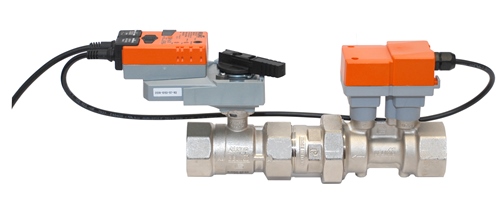The concept of pressure independent control is that you should be able to have the same amount of flow through a device regardless of the inlet pressure.
Paul Ehrlich,
Ira
Goldschmidt
& Angela Lewis
Building
Intelligence Group
|
December 2014 |
[an error occurred while processing this directive] |
|
Pressure Independent Control Valves
The concept of pressure independent control is that you should be able to have the same amount of flow through a device regardless of the inlet pressure. |
Paul Ehrlich,
Ira
Goldschmidt
& Angela Lewis December
Issue -
BAS Column
|
| Articles |
| Interviews |
| Releases |
| New Products |
| Reviews |
| [an error occurred while processing this directive] |
| Editorial |
| Events |
| Sponsors |
| Site Search |
| Newsletters |
| [an error occurred while processing this directive] |
| Archives |
| Past Issues |
| Home |
| Editors |
| eDucation |
| [an error occurred while processing this directive] |
| Training |
| Links |
| Software |
| Subscribe |
| [an error occurred while processing this directive] |
On several recent projects, we have had control contractors who have
promoted the use of pressure independent control valves (PICV).
This has led to some interesting discussions about the costs and
benefits of these valves.
The original concept of a PICV was basically a single casting that
included both a control valve (generally a ball valve) along with a
pressure regulator for flow control. In effect, it was a
balancing valve and control valve in a single package. More
recently, suppliers are starting to offer more sophisticated solutions
that include logic as part of the valve assembly along with a control
valve, flow meter, and optional temperature sensors. These
electronic pressure independent valves may be more cost effective for
larger sizes and offer additional benefits in terms of monitoring and
control.

Electronic Pressure Independent Control Valve - image courtesy of Belimo
The concept of pressure independent control is that you should be able
to have the same amount of flow through a device regardless of the
inlet pressure. For example, a pressure independent VAV box
controller operates by resetting the flow setpoint in response to zone
temperature. The box flow is controlled regardless of any
variation in the incoming air pressure. The anticipated result is more
stable control, and improved feedback on system operation.
The suppliers of PICVs claim numerous benefits resulting from the use of these valves. Potential benefits include:
[an error occurred while processing this directive]
All of these could definitely be beneficial, however the more critical
question is whether the benefits are worth the added costs. We
have been focusing on the use of either mechanical or electronic
pressure independent valves for large air handlers. There is
definitely a cost premium to the use of these valves; on a recent
project, the cost of the valve with installation was 2 – 3 times that
of a globe valve. The question then becomes is it worth it?
To determine this, we ran a version of our energy model using a plug in
to simulate the PICV. After several runs we did find that there
were benefits in terms of reduced system pumping, resulting in a simple
payback on the premium for the valves of a few years. Given the
other potential benefits including improved discharge control, better
operator feedback, and the potential for BTU metering at the coil it
seemed worth considering.
We would encourage readers to keep an open mind and carefully consider the use of PICVs for your next project.
About the Authors
 Paul and Ira first
worked together on a series of ASHRAE projects
including the BACnet committee and Guideline 13 – Specifying DDC
Controls. The formation of Building Intelligence Group provided them
the ability to work together professionally providing assistance to
owners with the planning, design and development of Intelligent
Building Systems. Building Intelligence Group provides services for
clients worldwide including leading Universities, Corporations, and
Developers. More information can be found at
www.buildingintelligencegroup.com
We also invite you to contact
us directly at Paul@buildingintelligencegroup.com or
ira@buildingintelligencegroup.com
Paul and Ira first
worked together on a series of ASHRAE projects
including the BACnet committee and Guideline 13 – Specifying DDC
Controls. The formation of Building Intelligence Group provided them
the ability to work together professionally providing assistance to
owners with the planning, design and development of Intelligent
Building Systems. Building Intelligence Group provides services for
clients worldwide including leading Universities, Corporations, and
Developers. More information can be found at
www.buildingintelligencegroup.com
We also invite you to contact
us directly at Paul@buildingintelligencegroup.com or
ira@buildingintelligencegroup.com
[an error occurred while processing this directive]
[Click Banner To Learn More]
[Home Page] [The Automator] [About] [Subscribe ] [Contact Us]